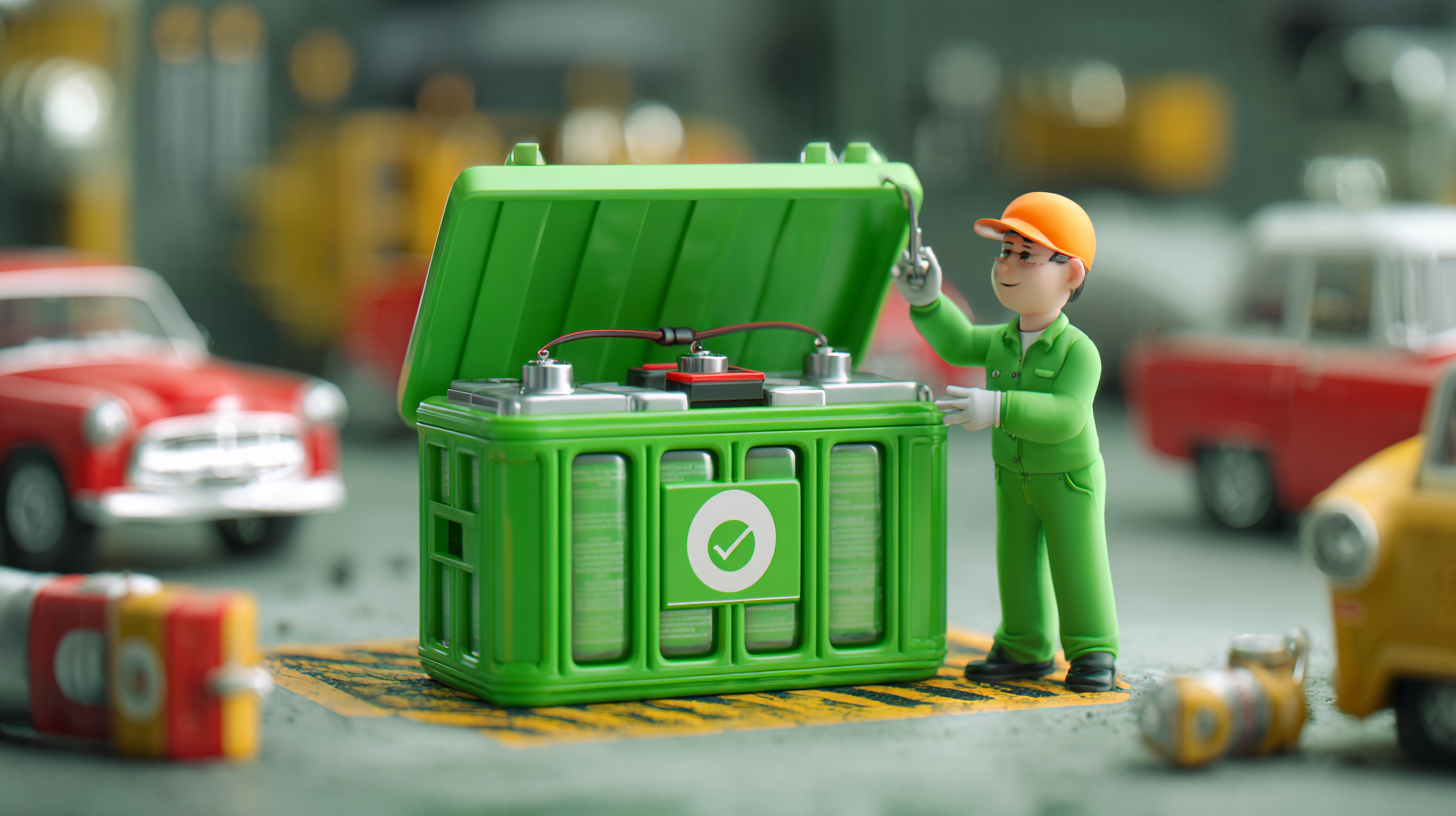Understanding After Sales Service Benefits and Cost of Repair for Best Car Battery Purchase
When it comes to ensuring the longevity and performance of your vehicle, understanding the nuances of car battery purchase is essential. A car battery is not just a power source; it's a critical component that influences how your vehicle functions, especially in demanding conditions. Different types of car batteries offer unique characteristics and are suited for various applications, from everyday commuting to off-road adventures.

This blog aims to explore the benefits of after-sales service and the potential costs associated with battery repairs, enabling you to make an informed decision when opting for a car battery purchase. By delving into the practical aspects of battery types and how they cater to specific vehicle needs, you'll gain valuable insights that can help you choose the right product, ultimately enhancing your driving experience.
Benefits of Understanding Different Types of Car Batteries for Optimal Performance
When considering the optimal performance of car batteries, understanding the different types available is crucial. The market now includes traditional lead-acid batteries, lithium-ion batteries, and emerging sodium-ion technologies. Each type exhibits distinct characteristics and lifespan, which can significantly influence performance outcomes. Lithium-ion batteries, known for their higher energy density and lighter weight, have become the go-to choice for many applications, but they come with sustainability challenges. Recent literature highlights the need for an eco-friendly alternative, with sodium-ion batteries emerging as a green substitute. These batteries promise to reduce dependence on lithium while maintaining performance efficiency, making them an attractive choice for environmentally conscious consumers.
Moreover, understanding the components and testing methods of various battery types is essential for informed purchasing decisions. Reports indicate that battery material testing plays a vital role in the development and manufacture of high-performance batteries, ensuring they meet safety, reliability, and lifespan standards. For instance, advancements in battery technology aim to extend usage durations significantly; the best batteries today can last much longer than those produced just a few years ago. As consumers become more aware of sustainability, the demand for batteries that not only perform excellently but also adhere to eco-friendly practices is likely to increase. Hence, exploring the intricate landscape of battery types equips consumers to make informed choices for their vehicles.

Cost Analysis: Repair vs. Replacement of Car Batteries – What You Need to Know
When it comes to managing car batteries, understanding the cost implications of repair versus replacement is crucial for every vehicle owner. Repairing a car battery can sometimes seem like the more economical option at first glance. However, it's essential to consider the long-term benefits and efficiency of a replacement. While repairs might save you money initially, a failing battery that requires frequent repairs can lead to higher costs over time, not to mention the potential inconvenience of being stranded.

Tip: Always assess the age and condition of your car battery. If it’s nearing the end of its typical lifespan, investing in a new battery might be more prudent than sinking money into repairs. Additionally, consider the warranty and after-sales service benefits provided by your battery supplier. This can add significant value to your purchase.
In some instances, a simple repair can restore battery functionality, but it is important to know your limits. Testing the battery's charge effectively and knowing when it's time to replace it can save you from unnecessary repairs down the line. Regular maintenance checks not only prolong the life of your battery but also ensure that you are driving safely without the worry of unexpected battery failures.
Tip: Develop a routine for checking your battery health. Look for signs of corrosion, loose connections, or unusual sounds; these can indicate issues that might call for immediate attention. Keeping an eye on these aspects lets you address potential problems before they escalate into costly replacements or inconvenient repairs.
How to Choose the Right Car Battery Based on Vehicle Requirements and Usage
Choosing the right car battery hinges on understanding your vehicle's specific requirements and usage patterns. With the global automotive power module market projected to rise from $9.86 billion in 2025 to $25.14 billion by 2032—reflecting a compound annual growth rate (CAGR) of 14.3%—the significance of selecting the correct battery becomes clearer. Factors such as vehicle type, performance needs, and environmental conditions must be considered to ensure optimal functionality and longevity.
Additionally, the battery type plays a critical role in overall performance, particularly as the electric vehicle (EV) sector continues to grow. For example, studies indicate that EV batteries can last up to 20 years, significantly outpacing traditional fuel vehicles by an estimated six years. As manufacturers increasingly invest in self-developed batteries, these innovations promise not only cost reduction but also enhanced service capabilities and adaptability. Thus, while choosing between different battery brands may seem daunting, evaluating your vehicle's unique requirements alongside the evolving technology landscape can facilitate a more informed decision.
Understanding After Sales Service Benefits and Cost of Repair for Best Car Battery Purchase
| Battery Type | Typical Lifespan (Years) | Cost Range ($) | Warranty (Years) | Expected Repair Cost ($) | After Sales Service Benefits |
|---|---|---|---|---|---|
| Lead Acid | 3-5 | 50-120 | 1-2 | 30-50 | Standard customer support, diagnostic services |
| AGM (Absorbent Glass Mat) | 4-7 | 100-250 | 3-4 | 50-70 | Extended warranty, priority customer service |
| Lithium-Ion | 5-10 | 200-500 | 5-7 | 100-150 | Comprehensive support, low maintenance costs |
| EFB (Enhanced Flooded Battery) | 3-6 | 80-150 | 2-3 | 40-70 | Basic service package, quick repair options |
Industry Insights: Average Lifespan and Failure Rates of Various Battery Types
When considering the purchase of a car battery, understanding the average lifespan and failure rates of various battery types is crucial. Lead-acid batteries, commonly used in most vehicles, typically last between 3 to 5 years but can fail unexpectedly due to extreme temperatures or poor maintenance. In contrast, absorbed glass mat (AGM) batteries are more resilient and can last up to 7 years, making them a favorite for high-performance vehicles and those with heavy electrical demands.
**Tip:** Regularly check your battery’s voltage and clean the terminals to prolong its life. Neglecting these simple checks can lead to premature failure and costly repairs.
Lithium-ion batteries are emerging as a newer option, especially in electric vehicles. They boast a lifespan of 8 to 10 years but can suffer from performance issues if charged improperly or exposed to extreme conditions. The failure rates for lithium-ion batteries are generally lower, but their higher cost may deter some buyers.
**Tip:** When choosing a battery, consider your car’s specific energy needs and driving conditions to ensure optimal performance and longevity. Keep in mind, investing in a quality battery with a good warranty can save you money in the long run.
Understanding After Sales Service Benefits and Cost of Repair for Best Car Battery Purchase
After-Sales Service: How Warranty and Support Impact Your Car Battery Investment
When investing in a car battery, understanding after-sales service is crucial to maximizing your purchase's value. A comprehensive warranty can provide peace of mind, ensuring that you're covered in case of unexpected issues. It's essential to consider not just the initial cost of the battery but also the long-term investment in support and services available after the sale. Many manufacturers are expanding their service networks, making it easier for customers to access assistance, repairs, and replacements as needed.
In the context of expanding electric vehicle markets, after-sales support becomes even more significant. As countries transition to electric vehicles and new regulations emerge, buyers need to feel confident that their investment will be backed by reliable maintenance and repair services. For instance, recent expansions in the aftersales networks in various regions show a commitment to enhancing customer experiences. This focus on support not only helps in nurturing consumer trust but also plays a critical role in the growth of the electric vehicle segment.
